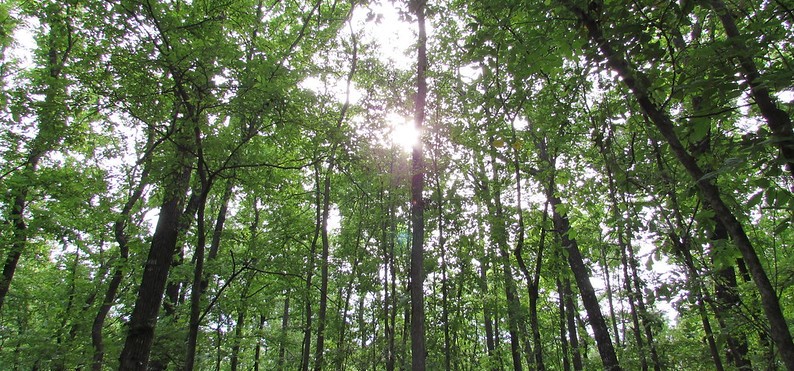The State We're In
Take a tech break and get outside!
Spring is here and many folks are itching to boost their health and fitness. But with more than a year into the Covid-19 pandemic, too many of us are still stuck at computer screens: working from home, socializing online, exercising in virtual classes and even supervising children’s virtual schoolwork.
Health professionals are increasingly urging people to get outside for their physical and mental well-being. Some tout walking 10,000 steps a day, and others push for outdoor time in nature.
One of them is Jared Hanley, co-founder and CEO of NatureQuant. This Oregon-based startup is working on an app to evaluate the quality of green spaces and help users track the time they spend in nature, just as they might count steps.
NatureQuant recently analyzed aerial and satellite data from 500 of the most populous U.S. counties to come up with a “nature score” for each place. In a timely study, the company found that counties with lower nature scores can be predicted to have higher per-capita rates of Covid-19. Conversely, those with higher nature scores appear linked to a slower spread of the coronavirus.
The company’s theory – that more time outdoors means improved health – builds upon decades of studies documenting the importance of spending time in nature.
During the 1918 Spanish Influenza pandemic, for example, scientists discovered that patients treated outdoors in fresh air and sunlight recovered faster than those treated indoors.
In Japan, the concept of shinrin-yoku, meaning “forest bathing” or “taking in the forest,” became popular with those looking to boost health. Forest bathers slow down and immerse themselves in nature by experiencing the smells, textures, sounds, tastes and sights of the forest.
A Japanese study published in 2011 compared the effects of walking in the city to taking a forest walk. Although both activities required the same amount of physical activity, researchers found that walking in the forest led to significant reductions in blood pressure and certain stress hormones.
In addition, forest bathing decreased anxiety, depression and fatigue, and increased levels of cancer-fighting cells.
It’s not just adults who need more nature. Author Richard Louv coined the term “nature deficit disorder” in his 2005 book, Last Child in the Woods, to describe the impacts of spending too much time indoors. He argued that children deprived of “Vitamin N” – nature – can develop attention difficulties, obesity, higher rates of emotional and physical illnesses, and diminished use of their senses.
So how much time should we spend outside in nature to reap maximum benefits?
A 2019 study by researchers at the University of Exeter in England analyzed data from nearly 20,000 people reporting on the time they spent in places like parks, forests and beaches.
According to the study, the likelihood of participants reporting good health or feelings of well-being was significantly greater after 120 minutes of contact with nature. More time outdoors was even better, with the benefits hitting a plateau after 200 to 300 minutes of exposure to nature.
Researchers reported that the pattern was consistent across all key groups, including older adults and those with long-term health issues. And it didn’t seem to matter whether people got their weekly nature exposure in one dose or spread it over shorter outdoor visits.
Why is nature so good for us?
First, natural places like forests, parks and beaches likely have better air quality than urban areas, and being in sunlight increases the vitamin D in your body. Physical exercise works your muscles and gets your heart pumping, improving all of your body’s systems.
Being in nature also reduces stress. It has been theorized that nature’s curving geometry, saturated colors and soft sounds are more soothing than the straight lines and blaring noise of city streets, allowing people to mentally relax and refresh their ability to focus.
Unfortunately, not everyone has equal access to nature. Urban residents, especially, often live far from the sights and sounds of nature.
That’s why some researchers are pushing policy makers to place a greater value on access to nature. Biologist Gretchen Daily of Stanford University in California pioneered the idea that “ecosystem services” provided by natural lands include mental health benefits. Daily is a co-founder of the Natural Capital Project, which offers free science-based computer programs to guide investments in natural places, with the goal of creating more livable and healthy cities.
This spring, take a break from Zoom, Google Meets, Facetime and all virtual technology, and get outdoors!
Whether you’re listening to birds in a neighborhood park, watching waves at a beach or soaking in the sights and smells of a deep green forest, your mind, body and spirit will thank you. And if you can get in some steps, too – maybe 10,000? – it’s even better. Walking and hiking are the easiest ways to exercise, offering such great benefits that some doctors write their patients “prescriptions” for regular outdoor strolls!
Check out the studies for yourself! To read about spending 120 minutes a week in nature, go to https://www.ncbi.nlm.nih.gov/pmc/articles/PMC6565732/. For the Japanese study on walking in forest environments, go to https://pubmed.ncbi.nlm.nih.gov/21431424/. For more on nature deficit disorder, go to http://richardlouv.com/blog/what-is-nature-deficit-disorder/. To read a white paper by NatureQuant on exposure to nature, go to https://www.naturequant.com/NatureQuant-whitepaper.pdf. For more on the Natural Capital Project, go to https://naturalcapitalproject.stanford.edu/.
And to learn about preserving New Jersey’s land and natural resources – including parks and preserves for exercise and relaxation – visit the New Jersey Conservation Foundation website at www.njconservation.org or contact me at info@njconservation.org.
About the Authors
Alison Mitchell
Co-Executive Director
John S. Watson, Jr.
Co-Executive Director
Tom Gilbert
Co-Executive Director, 2022-2023
Michele S. Byers
Executive Director, 1999-2021
View their full bios here.
Filter
Get The Latest News
From The Garden State
In the
News

